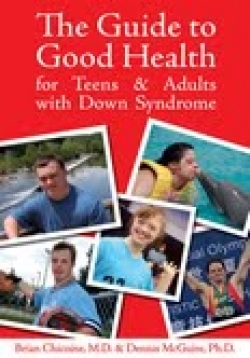The Guide to Good Health for Teens & Adults with Down Syndrome
- 2010 INDIES Winner
- Silver, Health (Adult Nonfiction)
Back in 1900, people born with Down syndrome (DS) had a life expectancy of nine years. Those born today have a life expectancy of fifty-six years. This increased longevity means that doctors, families, and individuals need new, updated information about age-related illnesses and how to maintain a fit, healthy lifestyle. Drawing on a combined sixty years of practical experience, doctors Brian Chicoine and Dennis McGuire offer exactly that in their second book about living with Down syndrome.
DS patients are more susceptible to some health issues—sleep apnea, obesity, gum disease—and less susceptible to others—asthma, most types of cancers—but the underlying premise of The Guide to Good Health for Teens and Adults with Down Syndrome is that wellness should be a primary goal throughout a person’s life. The authors, who have treated over 4,000 patients at the Adult Down Syndrome Center of Advocate Lutheran General Hospital, in Illinois, emphasize the need for good daily health habits, stressing that doctors and support people may need to find creative ways of listening to people with Down syndrome to get the whole story about their health.
With the introductory chapters addressing general elements of wellness such as medical screening, nutrition, and social health, the bulk of the book consists of chapters that focus on specific aspects of health, like thyroid disorders and gastrointestinal and liver concerns. Every chapter contains interesting case studies along with resources that offer further information.
Chicoine and McGuire are both practical in their advice and sensitive to circumstantial challenges. They point out that mental wellness is as important, and certainly linked to, physical health, and take care to explain that symptoms may present differently in patients with DS. Their language is never pedantic or condescending; other doctors, family members, and patients themselves will find their book useful and often fascinating.
The authors readily admit that their experience with DS is limited: “We will never completely know what it is like to be a person with Down syndrome. However, we repeatedly find that if we try to understand out patients’ perspective, it improves our care.” With this standard at the forefront of their approach to their patients, they are able to offer help beyond simple medical advice by improving the lives of both patients and the people who love them.
Reviewed by
Andi Diehn
Disclosure: This article is not an endorsement, but a review. The publisher of this book provided free copies of the book and paid a small fee to have their book reviewed by a professional reviewer. Foreword Reviews and Clarion Reviews make no guarantee that the publisher will receive a positive review. Foreword Magazine, Inc. is disclosing this in accordance with the Federal Trade Commission’s 16 CFR, Part 255.

